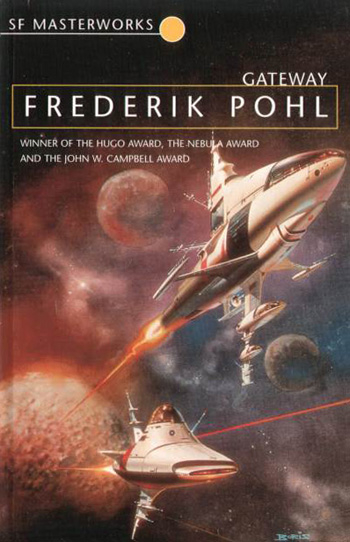Above, the first edition, a Del Rey Book (an imprint of Ballantine), which I bought when it first came out and disposed of in the Great Purge when Susan and I got married and I moved into her small flat. And below is a copy of the cover of the 1999 SF Masterworks edition which I picked up in our charity shop when it was about to be thrown out. Pity they couldn't have sprung for a new cover.
As you can see from the cover above it won all three of the major awards available in 1976 and I remember being pretty damn impressed with it, so I was wondering how it would fare some 35 years later. Now there's no question that Science Fiction dates and it isn't a very good guide to predicting technological development. Even ten years ago, few could have imagined how all-pervasive and essential to modern life the Internet would become. SF is particularly vulnerable to this change. Sometimes titles stand up, sometimes (indeed more often than not) they don't. For every still brilliant Alfred Bester's Tiger! Tiger! (aka the more prosaic The Stars My Destination) there are umpteen turgid tomes by the likes of E.E. 'Doc' Smith.
That said, the SF idea behind Gateway still holds up well. Some time in the near future the remnants of a vanished alien race is found on a tunneled-out asteroid, now named Gateway, on the edges of the solar system. All that's left behind are scattered mysterious objects and hundreds of ships with pre-programmed destinations. Volunteers can take out a ship which are for one, three and five persons. Most of the time they return with nothing, sometimes a little, sometimes they don't return at all, sometimes the crew are found dead, and sometimes they hit it big and the crew are made for life. The story itself alternates between sessions with a computer psychiatrist and his patient, our protagonist who made a big find and with the story of his life and relationships on Gateway. Dumped throughout the text on separate pages are a variety of fragmentary pieces which form a collage of life on Gateway.
Dumped is an emotive word but that's now how these sections appear. They don't break up the narrative which they would do inserted within the text but by appearing on separate pages they distract from the narrative forcing the reader to turn away from it.
The psychiatrist sections are obviously structured to build up to the big reveals, or rather reveals as there is more than one. Although one of the major plot strands is between the hero and his lover Klara, towards the end he has sex with a bisexual man who is also a sometime lover of Klara's. But even then this reveal is glossed over so quickly and obliquely that it comes over as an embarrassment on the protagonists part. This is where changes in society come in because these days it wouldn't be that much of an issue and from a modern day viewpoint is quite irrelevant and unimportant. Smoking is also very prevalent which is now, viewing the future never mind the present, almost unthinkable and shocking. The psychiatrist sections also don't work because the protagonist isn't really very interesting and, therefore, they go on far too long. As it is, the really big reveal, the guilty secret, isn't that much out of character.
While I wouldn't say that it doesn't deserve to be included in the SF Masterworks series, it is still a seriously flawed work but with a terrific central idea and one which Pohl expanded up over the course of another two novels. I don't, however, feel the urge to revisit them.


No comments:
Post a Comment